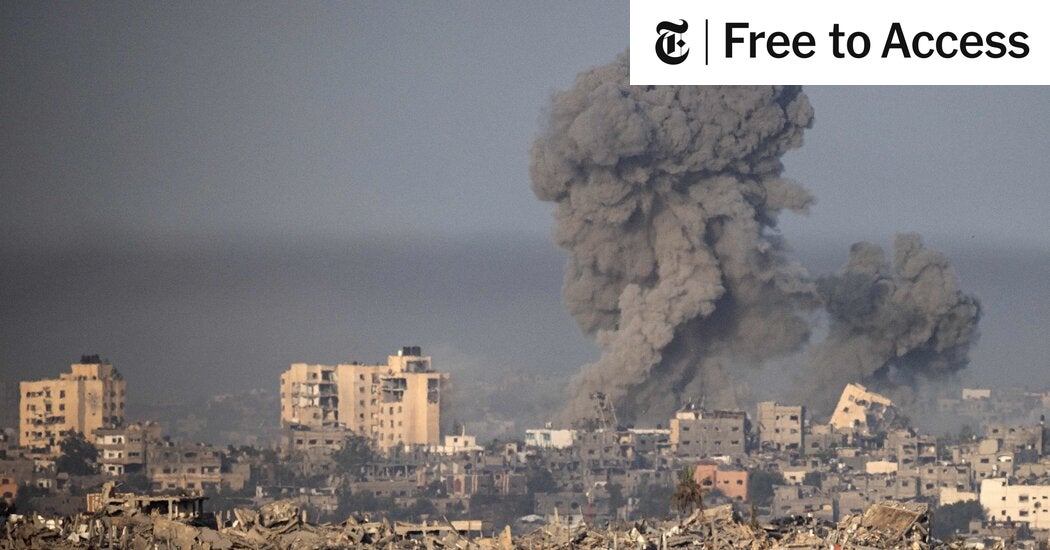Israeli airstrikes and ground troops pummeled northern Gaza amid the countdown to a four-day pause in fighting that was scheduled to start on Friday morning.
Numerous clashes between Israeli forces and Palestinian armed groups were reported in Jabaliya, an area just north of Gaza City that Israeli officials have called a stronghold of Hamas, the group that rules the Gaza Strip.
The Israeli military said it had encircled the area by Thursday afternoon and later added that it had discovered six tunnel shafts during a raid on a compound on the outskirts of the neighborhood, including one inside a mosque. It said it had also uncovered combat equipment, including rocket launchers. Lt. Col. Richard Hecht, a military spokesman, called Jabaliya a “hot spot.”
Hamas, which launched an attack on Israel last month, has built a maze of hidden tunnels that some believe extend across most, if not all, of Gaza, the territory it controls. Dismantling the tunnels is a key part of Israel’s goal of wiping out Hamas’s leadership in the wake of the Oct. 7 attack.
Ameen Abed, a resident of Jabaliya, said in a phone interview on Thursday that more than 50 of his relatives and neighbors had been killed. The dead included an old friend whose body parts Mr. Abed said he had to collect.
“We no longer count martyrs,” Mr. Abed said, using the term that Arabic speakers employ to refer to those killed in war. “Northern Gaza is uninhabitable and unsafe.”
He said he had tried to flee the fighting on Monday, only to hear gunshots from snipers. He was taking shelter at a health center in Jabaliya along with thousands of others, and said he could hear heavy gunfire as the battles continued.
Mr. Abed said he received an Israeli call on Thursday warning him to leave the “battlefield” in the north, but he remained wary of moving south, anticipating that Israel would expand its ground operations there.
Fewer people have been leaving Gaza’s north, according to the U.N. Office for the Coordination of Humanitarian Affairs, which attributed the change to the expectation that a cease-fire was imminent. The office said that about 250 people had walked south on Wednesday, the lowest number since Israel began instructing Gazans to flee via a “corridor” on Salah al-Din Street.
Many people have been forced to travel on foot, and Mr. Abed said some of his relatives and neighbors, including children and older people, could not walk such distances. But those that remained in Jabaliya were desperate for food, medicines and cooking gas, he said.
“The hunger, the loss of loved ones and tiredness is eating people’s flesh,” he said. “People are dying slowly.”
Israel has allowed some aid to enter Gaza but has opposed fuel deliveries, saying that Hamas uses it for rocket attacks and has stockpiled fuel intended for civilians.
The Gazan Health Ministry put the death toll at more than 13,000 this week, including thousands of women and children.
The U.N. warned that the risk of severe dehydration and waterborne disease was rising in the near absence of fresh water in the north. An Israeli pipeline carrying water to the area remained shut off, and the local desalination plant still could not function without fuel, it said.
Aid groups say they have been unable to get access to the north to distribute bottled water. Bakeries have long ceased to operate, and wheat is reportedly scarce in markets. Livestock was facing starvation, and crops were increasingly being abandoned, the U.N. said.
There were also signs on Thursday that many Gazans who had fled to the south would try to return to their homes during a cease-fire. The Israeli army has said that residents would be barred from returning to the north during the pause and that it was preparing for the possibility of “disturbances” by residents who did try to return.
Israeli troops will remain in Gaza during the pause in fighting, the military said.


